More on those Ubiquitous Plastic Shopping Bags

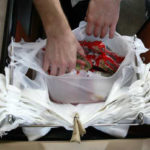
Yes, ubiquitous.
You’ve seen … from the grocery store bagging areas
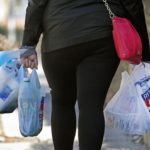 to lugging hands, to
to lugging hands, to
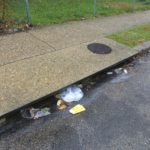
stormwater inlets,
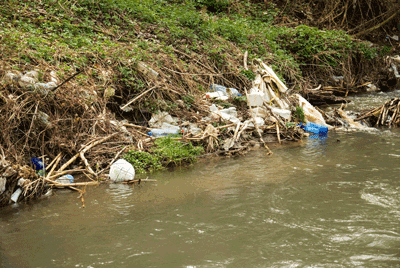 to river banks,
to river banks,
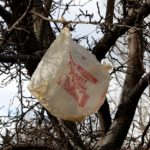 and, to tree branches.
and, to tree branches.
Ugh!
I haven’t seen them in my dreams, as yet, but they’re just about everywhere else.
A recent Washington Post article caught my eye. “County’s 5-cent tax on plastic is a mixed bag.” Catchy title.
Writer Bill Turque reported that plastic bags “make up about a third of the trash found in [Montgomery County, MD’s] streams and stormwater ponds.” The very polluted Anacostia River, that feeds the Potomac which shores include the nation’s capitol, is another recipient.
In passing the 2012 Carryout Bag Law, county officials hoped the 5-cent/bag tax would dissuade shoppers from purchasing plastic or paper bags in favor of handled, reusable bags for their tote.
The evidence, Turque reports, is not clear about the program’s success.
Over a recent 1-year period, revenue from disposable bags sold increased 3.2%. Encumbering a simple analysis and conclusion is the fact that the economy grew. And, there’ve been population and retail store increases.
That said, it’s known that over a comparable period of time, large grocery retailers also sold more plastic and paper bags. These were the destinations where officials thought there’d be a slowdown. But, if you leave Giant with 5 plastic bags of groceries costing upwards of $100, quite possibly 25 cents is de minimis in the minds of many. Happens the suburban Washington, DC county is one of the wealthiest in the country.
However, sales of disposable bags are down at specialty retailers, pharmacies and department stores, as reported in the piece.
Not reported in the piece are exemptions such as bags holding prescription drugs, those used to take purchased farmstand produce home and “doggy bags” from restaurants.
But, “traps at 15 stream sites in the county monitored [by the council of governments] show a decline in plastic bags collected, from 856 in 2011 to 777 in 2015.” The drop for the first half of ’16 is nearly a vertical drop; down to a nearly unbelievable 281.
Broadening the lens of this issue, other jurisdictions that have enacted a similar law to Montgomery County’s, both for plastic and paper bags, include the District of Columbia, New York City, Brownsville, TX, Portland, ME and, not surprisingly, Boulder, CO.
If you’re shopping at the Safeway in Carmel-by-the-Sea you might run into Clint Eastwood, but you’re not going to be able to obtain disposable grocery bags there for your tote. Anywhere in HI you’ll find no plastic disposable bags for purchase on any of the 4 islands. They’re banned.
What sometimes happens to me in my determination to avoid using disposable bags was reported as happening to Montgomery County’s exec, Isiah Leggett.
When filling a prescription at a pharmacy near his home recently, he found himself also grabbing “some toothpaste, aspirin and other items” before readying to leave. But, he’d left his reusable tote bag in his car. So, rather than being seen with disposable bags, or imaging himself being seen by someone with a smart phone camera–or retrieving his bag from the car–he carried all of his purchases barehanded out of the store. (Receipt clearly visible, right?)
“I’m not thinking of taking my bag into the pharmacy,” he said. What he was thinking about is that shame factor which propels many of us to do the right rather than the easy/throw-away thing.

I like my reusable bags to say something about me. One tote with snow-capped mountain scene I purchased back in June on the Olympic Peninsula. (If you missed that post, see here.) Another sports the logo of the most awesome pasta/Italian deli in my area (Vace’s in DC and Bethesda).
What’s your “image?”
From the bottom of the Olympic Peninsula bag comes this information:
- The average reusable bag has the lifespan of over 700 plastic bags, and the average person uses between 300-500 plastic bags/yr. One person alone can save over 22,000 plastic bags in their lifetime by using a reusable bag.
- 14 plastic bags contain enough petroleum to drive a car 1 mi.
- Worldwide, about 4B plastic bags become litter in a year.